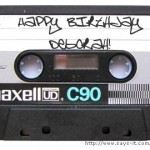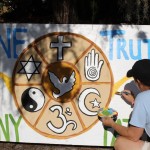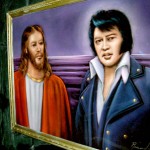In response to a niftly little post by my friend Tripp Hudgins (that was a result of a great little FB te-ta-te) I have some rambling thoughts.
Tripp I am grateful that you have lifted up the issue of evangelical siloing that’s bugging you. Allow me to quote you just a teeny bit to invite everyone else into the conversation.
Here’s my quick list-like take on what’s afoot:
1. American Evangelicalism is anti-institutional, and. . .
2. . . .disregards other institutional forms of Christianity in America as somehow irrelevant, which leads to. . .
3. . . . a profound habit of isolationism or, wait for it, siloing.
4. Thus, they are constantly reinventing The Church with each generation.
5. Relatedly, American Evangelicalism’s more conservative iterations proclaim to be The One True Church. Ah well.
It has often bugged me but it seems any time I bring up the concern I am dismissed with words like shrill, harpy and condescending. Perhaps since you are a man of great wisdom, clear writing and strong faith you will enjoy a more robust conversation that I have had in the past.
I too have been troubled by the language I hear in conversation with my brothers and sisters from evangelical backgrounds. I suppose what troubles me most is the tone that seems to imply the speaker or author is speaking for, about or to the Church Universal. Where is this problematic is it appears as if the speaker has no knowledge of decades and decades of Christian history where some sociological and theological changes have long been afoot. It has been my experience with folks in evangelical circles that they have been worked on, early and often, to produce the notion that either a. there are no other Christians besides them b. all other manifestations of Christianity are contrivances of the Evil one. More often than not it gives the appearance that one simply does not know squat about broader Christian history. And knowing most of my conversation partners that just does not ring true.
Now don’t get me wrong, I know all to well (and from my own painful experiences) that we mainliners have a theological and ecclesiological superiority complex at times too. I have heard dear UMC friends unashamedly offer that Wesley got it right and that if other denominations could deeply invest in the Wesleyan Quadrilateral we’d all be a lot better off. I have been in conversation with beloved Presbyterians who are certain that their system and theology is Right above all others.
And the good Lord knows we mainliners have a hard as hell time moving our ecclesial cheese even though we are right cool with evolving theology.
Tripp, when you and I were happily kvetching (and I goaded you into running with your post) a wise and thoughtful passage from Doug Pagitt’s book Church in the Inventive Age came to mind. I share it here to acknowledge our own shortcomings and to shed light on the notion that some from other traditions also see the truth of their own baggage. It is a long quote but seems rather perfect for contributing to this conversation.
“The Evangelical / Pentecostal folks are often highly creative in the look and feel of their buildings. They adopt various musical styles for worship. They are comfortable with casually dressed pastors and parishioners. They are often the first to utilize new technology—think about the way evangelicals have capitalized on radio, books, television, and the Internet. They are open in how and when they meet—
church services might be held on Saturday nights, Sunday afternoons, Tuesdays at 6. They will meet in bars, theaters, warehouses, and homes. The aesthetics and the tools are always open for discussion.
But when it comes to knowledge and values, the innovation tends to stop. I talk to people who tell me, “We can change the package but not the product,” or, “The methods should change but the message must always stay the same.” Changes on the Ideas side of the grid are seen as a threat to the gospel itself.
Denominational / Mainline folks tend to hold their understanding and values with an open hand. They are the ones voting on homosexual clergy and debating gay marriage. They were the first to ordain women and to blend denominations rather than break off into smaller factions. They don’t have statements of faith or codes of conduct. They work hard to use inclusive language for God and each other. They have planted churches all over the world that are culturally sensitive in their portrayal of the gospel.
But when it comes to the objects side of the church, it can be as rigid and fundamentalist as any other. The layout of the church building is sacrosanct—the pulpit goes here, the lectern there. Words and songs and colors carry deep
meaning and they are not to be tampered with.” ~ Doug Pagitt
As we move toward what some are calling convergence, I pray we can learn from one another, respect the historical contributions of one another without wallowing in or rigidly clicking to the past while we all embrace the faithful, passionate and Spirit led movement toward more and more change that hopefully is always on a trajectory of Kingdom building.












